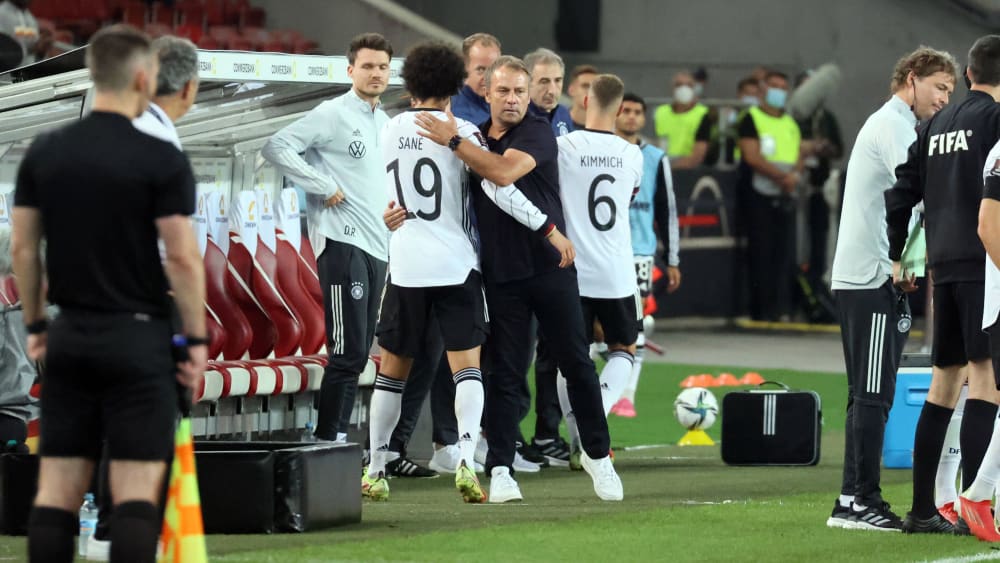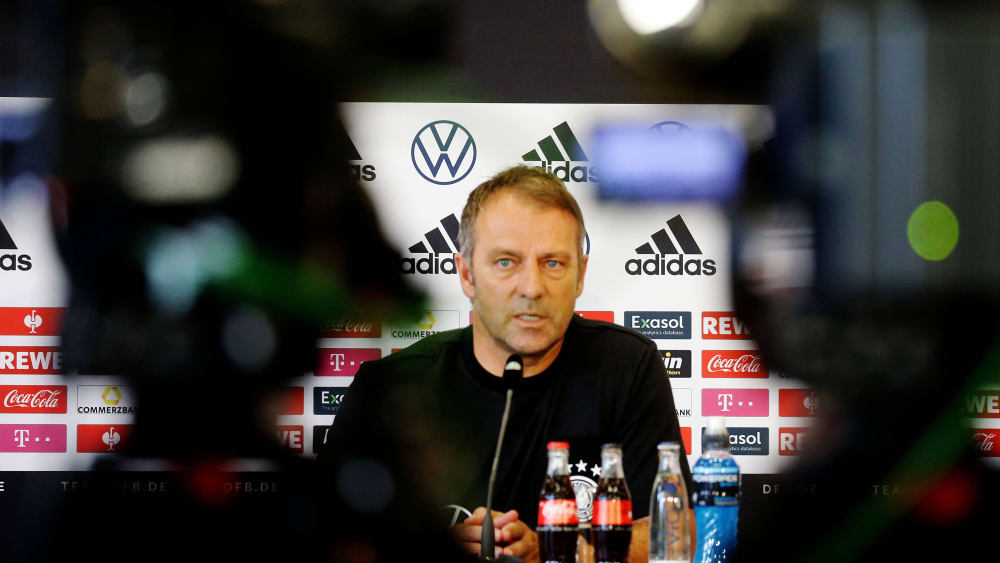The national team has been in the doldrums since 2018, plus worries about young talent: two coaches are to change course
Statistically, the opening trilogy under the direction of new national coach Hansi Flick has been a success. There was increasing applause for three wins, nine points and 12:0 goals, after the tough 2:0 premiere against Liechtenstein had solidified the recently accustomed horror of the national team. Even against the 188th-ranked team in the world with fourth- and third-rate players, a lack of ideas, dribbling and a genuine centre-forward had proved a hindrance against an eleven encapsulated at the back, before the 6-0 display in the second part against Armenia plus the 4-0 final act in Iceland brightened the bleak mood.
Flick, the personification of optimism
So Flick, 76 kilos personified optimism, talks in high spirits about his first activities as DFB head coach. As in the same leading role at FC Bayern, he ignores his ego and talks permanently about his coaching team, which is on the road non-stop, London, Paris, Turin, in the Bundesliga arenas anyway.
In order to find out about the current state of his chosen players, Flick maintains personal contact with his colleagues at the clubs, abroad with the German coach Tuchel (Chelsea FC) as well as with the Spaniard Guardiola (ManCity) or the Argentine Pochettino (Paris). At home, all 18 Bundesliga coaches are his interlocutors. A new verbal offensive is being practised there.
Bundesliga coaches should “contribute with suggestions”.

As “brutally open” Frank Kramer experiences the current top DFB coach. Although the coach cannot serve with a current German international in Bielefeld, he was encouraged by Flick “that we contribute with suggestions”. Another very experienced Bundesliga coach says enthusiastically that no national coach has ever called him before, not even abroad. All around, Flick’s proactive, integrative manner is highly accepted. He discussed Sané’s transfer to the left wing with his successor in Munich, Nagelsmann, and how to deal with the injured Reus with Rose in Dortmund. When Sané was booed in the second game of the season against Cologne, Flick immediately strengthened him with a call, which young talent Musiala also received recently after his injury. The boy was amazed.
With these changed manners, Flick is striving for a new culture: communicative, cooperative, collective. He is pursuing a holistic approach. Flick wants to take everyone with him; the national team and German football as a whole are to become an overall patriotic mission. Everyone should feel responsible for the common success, the coaches in the clubs, every player on the pitch anyway. Already at his presentation, Flick opened up the chance for all players to join his elite, saying that performance alone counts, nothing else.
“We must not point at each other, here the clubs, there the DFB and vice versa. We have to talk to each other. “
HANSI FLICK
In the same way, he wants to involve the entire league. After the conversation with kicker, he emphasises once again, already walking away, “because it’s so important to me: we must not point at each other, here the clubs, there the DFB and vice versa. We have to talk to each other”.
This ensemble also includes the coaches on the U sideshows. Flick had a decisive influence on the selection of Stefan Kuntz’s successor. Three candidates made the final cut, Antonio Di Salvo got the nod, with the veteran Gerland at his side in an advisory capacity. It’s a big legacy, Kuntz leaves as a two-time European U21 champion.
Eternally the Bundesliga beckons
The best coaches in the country should work for the federation, Oliver Bierhoff, director there, formulated years ago. Names like Sebastian Kehl, Miroslav Klose, Bastian Schweinsteiger, Philipp Lahm or Per Mertesacker came up. The DFB is far removed from this claim. Former Bundesliga coaches such as Baum or Wolf returned to professional football immediately after short stints at the U level (Wolf has now returned to the DFB). Kramer moved to the youth sector in Salzburg because of the prospect of better further training. Today he is the boss in Bielefeld.
The Bundesliga beckons forever, the big show is on here. The daily challenge and the publicity are more appealing than the background work in the association. And on average, a sub-coach at the DFB is paid at the middle or lower level of the second division.
DFB manager Bierhoff likes to praise the future DFB Academy. But this magnificent building must be enriched with content. Insiders say that there are already good guidelines for a common idea of the game, but that the U coaches are implementing them individually in a zigzag course: one prefers possession of the ball, while the other prefers forward momentum.
Away from the Hispanisation of German Football
Flick preaches a new pattern. The time of the Hispanisation of German football with “pass, pass, pass until boredom” should be over. Ball control yes, but with offensive endeavour in every action. Mentality, intensity, activity, creativity, quality, professionalism are the parameters that apply now. Inspired by the A-team’s soon-to-be brilliant performances, German football is supposed to take off to new heights after the crash of 2018. Bierhoff already propagated a return to the top of the world after the embarrassing 2018 World Cup, and now he is doing it again, as is Flick.
Captain Neuer names winning the World Cup in 2022 as a goal, Flick does not contradict.
At the European Championship in the summer, the DFB team was eliminated in the last 16.





